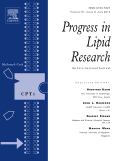
PROGRESS IN LIPID RESEARCH
Scope & Guideline
Advancing the Frontiers of Lipid Science
Introduction
Aims and Scopes
- Lipid Metabolism and Health Implications:
Research exploring how different types of lipids, such as omega-3 fatty acids and sphingolipids, impact human health, particularly in relation to cardiovascular, neurological, and metabolic diseases. - Structural and Functional Lipid Biology:
Studies detailing the molecular structure and functional roles of lipids in cellular processes, including lipid signaling, membrane dynamics, and interactions with proteins. - Lipidomics and Analytical Techniques:
Development and application of advanced lipidomic and analytical methodologies to profile lipid species in biological samples, contributing to a deeper understanding of lipid functions and interactions. - Lipid Roles in Disease Mechanisms:
Investigations into how alterations in lipid metabolism contribute to disease pathogenesis, including cancer, neurodegenerative disorders, and metabolic syndromes. - Plant and Microbial Lipid Research:
Research focusing on lipids in plants and microorganisms, including biosynthesis pathways, ecological significance, and potential applications in biotechnology and health.
Trending and Emerging
- Lipid Signaling and Disease:
There is an increasing focus on how lipid signaling pathways influence various diseases, including cancer and neurodegenerative disorders, highlighting the therapeutic potential of targeting lipid metabolism. - Microbiome and Lipid Interactions:
Emerging research examines the relationship between the gut microbiome and lipid metabolism, exploring how dietary lipids affect microbiota composition and function, and vice versa. - Innovative Therapeutic Uses of Lipids:
A trend towards investigating novel lipid-based therapies, including the use of lipid nanocarriers for drug delivery and the therapeutic potential of lipid mediators in various health conditions. - Environmental Impact on Lipid Availability:
Research addressing how climate change and environmental factors influence the availability and metabolism of essential lipids, particularly omega-3 fatty acids, is gaining traction. - Interdisciplinary Approaches to Lipid Research:
A notable trend in the integration of lipid research with other scientific disciplines, such as genomics, proteomics, and bioinformatics, to provide a more comprehensive understanding of lipid functions.
Declining or Waning
- Traditional Dietary Lipid Studies:
Research that primarily focused on the nutritional aspects of dietary lipids, such as simple comparisons of fat types, has seen a decline as more complex interactions and mechanisms are being explored. - Basic Lipid Chemistry without Biological Context:
Papers that focus solely on lipid chemistry without linking to biological implications or health effects are becoming less common, as the field shifts towards applied and integrative studies. - Historical Perspectives on Lipid Research:
Review articles providing historical context or retrospective analyses of lipid research trends are less prevalent, reflecting a move towards forward-looking research and innovative methodologies.
Similar Journals

Journal of Clinical Lipidology
Transforming understanding in lipidology and its clinical applications.Journal of Clinical Lipidology, published by Elsevier Science Inc, is a leading platform dedicated to advancing the understanding of lipidology and its impact on cardiovascular health. With an ISSN of 1933-2874 and E-ISSN 1876-4789, this esteemed journal boasts a remarkable Q1 ranking in key medical categories, including Cardiology and Cardiovascular Medicine, Internal Medicine, and Nutrition and Dietetics, solidifying its position as a vital resource for the latest research and clinical practices. This journal not only serves as a repository for groundbreaking studies but also provides insights into complex interactions between lipid metabolism and chronic diseases, including diabetes and obesity. Researchers, practitioners, and students will find a wealth of carefully vetted articles that drive innovation and improve patient outcomes in lipid management. Although it does not currently offer open access, the Journal of Clinical Lipidology ensures high visibility through rigorous peer review and a commitment to quality, making it an essential read for anyone invested in the future of lipidology.

EUROPEAN JOURNAL OF LIPID SCIENCE AND TECHNOLOGY
Exploring the intersection of biochemistry and technology.EUROPEAN JOURNAL OF LIPID SCIENCE AND TECHNOLOGY, published by WILEY, is a reputable academic journal dedicated to advancing the field of lipid science and technology. With an ISSN of 1438-7697 and E-ISSN 1438-9312, this journal serves as a critical resource for researchers, professionals, and students interested in the bioengineering, industrial applications, and nutritional science of lipids. Covering a broad spectrum from biochemistry to food science, it holds distinguished rankings across multiple categories, including Q2 in Chemistry and Food Science, and Q3 in Biotechnology, showcasing its significance in the interdisciplinary study of lipids. The journal welcomes Open Access options, fostering the dissemination of knowledge and innovation in lipid research. With converged years extending from 2000 to 2024, this journal remains at the forefront of lipid-related research, encouraging scholarly contributions that push the boundaries of science and technology.

Lipids in Health and Disease
Transforming lipid research into actionable health solutions.Lipids in Health and Disease, published by BMC, stands as a leading open-access journal dedicated to advancing the understanding of lipid metabolism and its implications for health and disease. Since its inception in 2002, this journal has fostered accessibility to cutting-edge research, ensuring that knowledge in this vital field is disseminated widely to researchers, clinicians, and students worldwide. With a commendable Q1 ranking in multiple categories including Clinical Biochemistry and Endocrinology, Diabetes and Metabolism, it appeals to a diverse readership, positioning itself at the forefront of research in biochemistry and medicine. It boasts an impressive Scopus rank, where it excels in areas such as Endocrinology, Diabetes and Metabolism and Clinical Biochemistry, making it an essential resource for those looking to deepen their understanding of lipid biology and its clinical applications. Researchers can share and access findings that have significant implications for public health and disease prevention, emphasizing the journal's commitment to fostering innovation and collaboration in the scientific community.

Nature Metabolism
Driving innovation in the understanding of metabolism.Nature Metabolism, published by NATURE PORTFOLIO, is a leading journal dedicated to advancing the field of metabolic research and its implications across various biological systems. Since its inception in 2019, this esteemed journal has rapidly established itself as a vital resource for researchers, professionals, and students alike, reflecting its prominence through a prestigious Q1 ranking in several key categories including Cell Biology, Endocrinology, Diabetes and Metabolism, Internal Medicine, and Physiology. With an impressive Scopus ranking, underscoring its impact in Medicine and Biochemistry disciplines, Nature Metabolism offers an exceptional platform for disseminating high-quality research that explores the intricate mechanisms of metabolism and its association with health and disease. Although currently not open access, it continues to gain visibility and appreciation within the scientific community, ensuring that groundbreaking findings reach interested audiences globally from its hub in Berlin, Germany. Whether you are an experienced researcher or an aspiring student, Nature Metabolism serves as an invaluable asset in navigating the complexities of metabolic science.

PPAR Research, an esteemed journal published by HINDAWI LTD, specializes in the rapidly evolving fields of drug discovery and pharmacology, contributing significantly to the body of research surrounding peroxisome proliferator-activated receptors (PPARs) and their roles in various biochemical processes. With an open access policy implemented since 2006, the journal ensures that its high-quality content is readily available, promoting widespread dissemination of knowledge. Currently ranked in the Q2 category for both Drug Discovery and Medical Pharmacology, it boasts a respectable position within the scientific community, evidenced by its Scopus rankings. PPAR Research serves as an essential resource for researchers, professionals, and students looking to advance their understanding of PPAR biology and its implications in therapeutic development. The journal's commitment to excellence and accessibility makes it a key player in supporting innovative research and critical discussions in the life sciences.

ARTERIOSCLEROSIS THROMBOSIS AND VASCULAR BIOLOGY
Exploring the frontiers of cardiovascular medicine and innovation.ARTERIOSCLEROSIS THROMBOSIS AND VASCULAR BIOLOGY, published by Lippincott Williams & Wilkins, is a leading journal in the field of cardiovascular medicine, dedicated to the advancement of research surrounding arterial diseases, thrombosis, and vascular biology. With an impressive impact factor indicative of its reach and influence, this journal occupies a prominent position in the Q1 category of cardiology, ranking 13th out of 387 in its field according to Scopus, placing it within the top 96th percentile among cardiovascular research journals. Since its inception in 1990, ARTERIOSCLEROSIS THROMBOSIS AND VASCULAR BIOLOGY has been pivotal in disseminating cutting-edge research that drives innovation and education in cardiovascular health. Although it does not operate under an open access model, the journal is a vital resource for researchers, clinicians, and students looking for high-quality, peer-reviewed articles that contribute to the understanding and treatment of cardiovascular and vascular disorders. Its commitment to rigorous scientific standards and its focus on impactful findings make it an essential publication for anyone dedicated to the field.

PHYCOLOGICAL RESEARCH
Transforming our understanding of algae and their environments.PHYCOLOGICAL RESEARCH is a leading journal in the field of aquatic and plant sciences, published by Wiley, recognized for its commitment to advancing knowledge in the study of algae and their ecological significance. With a diverse scope encompassing ecological interactions, evolutionary behaviors, and physiological processes, PHYCOLOGICAL RESEARCH aims to provide a platform for researchers to disseminate innovative findings and insights pertinent to both agricultural and biological sciences. The journal's impressive rankings—placing it in the 74th percentile within Agricultural and Biological Sciences (miscellaneous) and holding a Q2 category in key fields—underscore its impact and importance in academia. Despite not being open access, the journal ensures broad distribution and visibility through its dedicated readership. Since its inception in 1995, PHYCOLOGICAL RESEARCH has continuously evolved, shaping and influencing the direction of research in phycology and related disciplines, making it an essential resource for students, professionals, and researchers alike.

CURRENT OPINION IN LIPIDOLOGY
Exploring the forefront of lipid science.Current Opinion in Lipidology is a premier journal published by Lippincott Williams & Wilkins, offering critical insights into the ever-evolving landscape of lipid research. With an impressive convergence spanning from 1990 to 2024, this journal serves as an essential platform for researchers, clinicians, and professionals dedicated to the study of lipids in relation to cardiovascular health, endocrinology, and metabolism. The journal currently holds a distinguished Q1 ranking in Cardiology and Cardiovascular Medicine, Endocrinology, Diabetes and Metabolism, and Nutrition and Dietetics, showcasing its significant impact in these fields. Additionally, it ranks in the Q2 quartile for Cell Biology and Molecular Biology, underlining its comprehensive approach to lipidology. Though not open access, the content is rich with cutting-edge reviews, clinical studies, and expert opinions that aim to advance knowledge and practice in lipid metabolism, making it a valuable resource for anyone seeking to stay abreast of the latest developments in lipid research.

BIOCHIMIE
Exploring Innovative Insights in Molecular BiologyWelcome to BIOCHIMIE, a prestigious journal dedicated to advancing the field of biochemistry and related areas of medicine. Published by Elsevier France - Editions Scientifiques Medicales Elsevier, this journal has been a cornerstone of scientific communication since its inception in 1971 and will continue to contribute essential research until 2024. With an impressive impact factor and categorized in Q2 for Biochemistry and Q1 for Miscellaneous Medicine, BIOCHIMIE ranks among the top quartiles in its fields, underscoring its significance and influence in the scientific community. Targeting a wide audience of researchers, professionals, and students, the journal publishes high-quality articles that explore innovative research and developments in biochemistry, genetics, and molecular biology, reflected in its Scopus ranking of 136 out of 438 in the biochemistry category. Despite its traditional publication format, the journal remains committed to promoting impactful research that drives the future of biochemistry and molecular medicine, ensuring that readers have access to critical insights that foster advancements in health and science.

PROSTAGLANDINS LEUKOTRIENES AND ESSENTIAL FATTY ACIDS
Fostering Innovative Research in Biochemistry and Cell BiologyPROSTAGLANDINS LEUKOTRIENES AND ESSENTIAL FATTY ACIDS is a distinguished peer-reviewed journal dedicated to advancing the understanding of the biological roles of prostaglandins, leukotrienes, and essential fatty acids in human health and disease. Published by Elsevier Science Ltd, this journal has been at the forefront of research since its inception in 1988 and continues to serve as a vital resource for researchers, clinicians, and students involved in the fields of biochemistry and cell biology. With its impact factor reflecting a solid academic presence—ranking Q3 in Cell Biology and Q2 in Clinical Biochemistry in 2023—this journal is recognized for its quality contributions, particularly in uncovering the biochemical pathways and clinical implications of these lipid mediators. Though not an open-access journal, it provides various access options to ensure the dissemination of critical findings. As the field evolves, PROSTAGLANDINS LEUKOTRIENES AND ESSENTIAL FATTY ACIDS remains a pivotal platform for the exploration and discussion of new methodologies, therapeutic avenues, and biological discoveries that impact patient care and the foundational sciences.